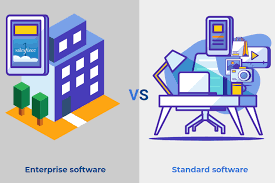Unlocking Business Potential: The Power of Enterprise Application Development
The Importance of Enterprise Application Development
Enterprise application development plays a crucial role in the modern business environment. As organizations strive to streamline their operations, enhance efficiency, and stay ahead of the competition, the need for robust and scalable software solutions has never been greater.
Enterprise applications are specifically designed to meet the unique needs of large organizations. These applications are complex, integrated systems that facilitate various business functions such as customer relationship management, supply chain management, human resources, and more.
Key Benefits of Enterprise Application Development:
- Improved Efficiency: Enterprise applications automate repetitive tasks, reduce manual errors, and optimize workflows, leading to increased productivity and efficiency.
- Enhanced Collaboration: By centralizing data and communication channels, enterprise applications promote collaboration among teams across different departments and locations.
- Data Security: Enterprise applications incorporate robust security features to protect sensitive business data from cyber threats and unauthorized access.
- Scalability: As organizations grow and evolve, enterprise applications can easily scale to accommodate changing needs without compromising performance.
- Better Decision-Making: With real-time analytics and reporting capabilities, enterprise applications provide valuable insights that enable informed decision-making at all levels of the organization.
The Development Process:
Developing enterprise applications requires a strategic approach that takes into account the specific requirements and goals of the organization. The process typically involves:
- Requirement Analysis: Understanding the business needs and defining clear objectives for the application.
- Design & Architecture: Creating a detailed plan for the application’s structure, user interface, data flow, and integration points.
- Development & Testing: Building the application according to specifications and rigorously testing it for functionality, performance, and security.
- Deployment & Maintenance: Implementing the application in the production environment and providing ongoing support, updates, and enhancements as needed.
In conclusion, enterprise application development is essential for organizations looking to optimize their operations, drive innovation, and achieve sustainable growth in today’s competitive landscape. By investing in custom-built solutions that align with their unique requirements, businesses can unlock new opportunities for success and stay agile in an ever-changing market.
Top 6 FAQs About Enterprise Application Development: Answers to Key Questions
- What is enterprise application development?
- Why is enterprise application development important for businesses?
- What are the key features of a good enterprise application?
- How long does it take to develop an enterprise application?
- What are the common challenges faced during enterprise application development?
- How can I ensure the security of my enterprise application?
What is enterprise application development?
Enterprise application development refers to the process of creating software solutions specifically tailored to meet the complex needs of large organizations. These applications are designed to streamline business operations, enhance efficiency, and facilitate seamless communication and collaboration across various departments. Enterprise application development involves analyzing the unique requirements of an organization, designing a robust architecture, developing scalable and secure software, and providing ongoing support and maintenance. By investing in enterprise application development, businesses can leverage technology to optimize their processes, improve decision-making, and stay competitive in today’s dynamic market environment.
Why is enterprise application development important for businesses?
Enterprise application development is crucial for businesses due to its ability to streamline operations, enhance efficiency, and drive growth. These custom-built software solutions are tailored to meet the specific needs of large organizations, facilitating functions such as customer relationship management, supply chain management, and data analytics. By investing in enterprise application development, businesses can improve productivity, foster collaboration among teams, ensure data security, and make informed decisions based on real-time insights. Ultimately, enterprise applications enable businesses to adapt to changing market dynamics, scale their operations effectively, and stay competitive in today’s fast-paced business environment.
What are the key features of a good enterprise application?
When it comes to enterprise application development, the key features of a good enterprise application include scalability to accommodate growing business needs, robust security measures to protect sensitive data, seamless integration with existing systems for efficient workflow management, user-friendly interface for enhanced usability, and advanced analytics capabilities to provide valuable insights for informed decision-making. A good enterprise application should also prioritize performance optimization, customization options to meet specific business requirements, and reliable support and maintenance services to ensure continuous operation and adaptation to evolving technologies. By incorporating these essential features, a well-designed enterprise application can significantly contribute to the success and competitiveness of an organization in today’s dynamic business environment.
How long does it take to develop an enterprise application?
Developing an enterprise application is a complex process that can vary significantly in duration depending on various factors. The timeline for developing an enterprise application typically ranges from several months to a year or more. Factors that influence the development timeline include the scope and complexity of the application, the availability of resources, the level of customization required, and any unforeseen challenges that may arise during the development process. It is important for organizations to work closely with experienced developers and project managers to establish realistic timelines and milestones to ensure a successful and timely delivery of the enterprise application.
What are the common challenges faced during enterprise application development?
During enterprise application development, several common challenges are frequently encountered. These challenges may include ensuring seamless integration with existing systems, managing complex data structures and workflows, meeting scalability requirements to accommodate growth, addressing security vulnerabilities to protect sensitive information, and maintaining compatibility across different platforms and devices. Additionally, balancing the need for customization with the constraints of time and budget can pose a significant challenge. Effective communication among stakeholders, careful planning, and leveraging best practices in software development are essential to overcoming these obstacles and successfully delivering robust enterprise applications that meet the needs of modern businesses.
How can I ensure the security of my enterprise application?
Ensuring the security of your enterprise application is paramount in safeguarding sensitive data and protecting your business from potential cyber threats. To enhance the security of your application, consider implementing robust authentication mechanisms, such as multi-factor authentication and role-based access control. Encrypting data both in transit and at rest, conducting regular security audits and penetration testing, and staying updated with security patches and updates are also crucial steps to mitigate vulnerabilities. Additionally, educating employees on best practices for data handling and implementing strict security policies can help create a culture of cybersecurity awareness within your organization. By proactively addressing security concerns and staying vigilant against evolving threats, you can strengthen the defense mechanisms of your enterprise application and uphold the integrity of your business operations.




